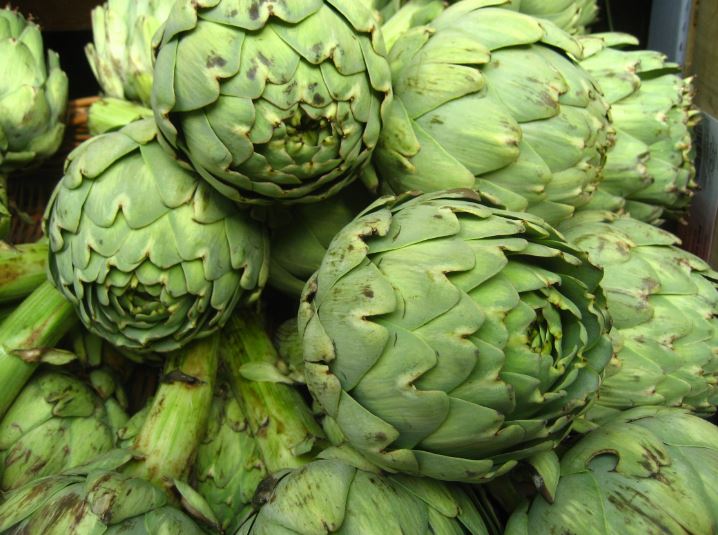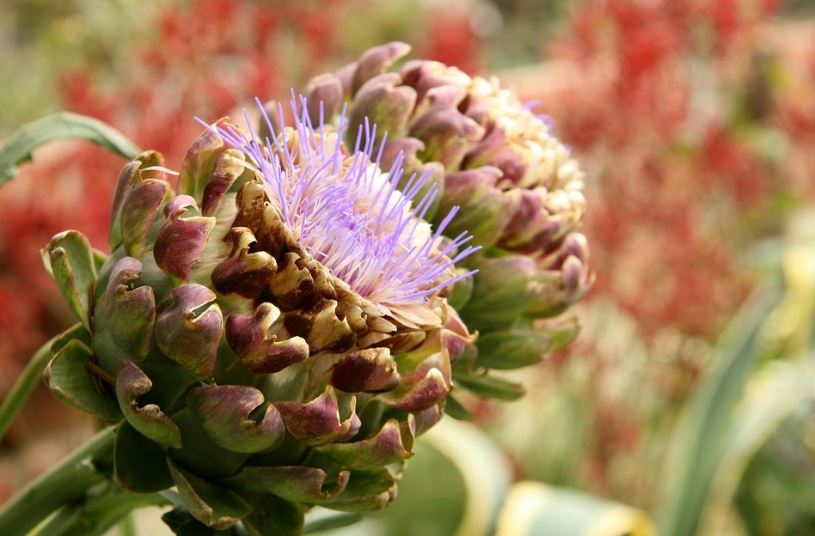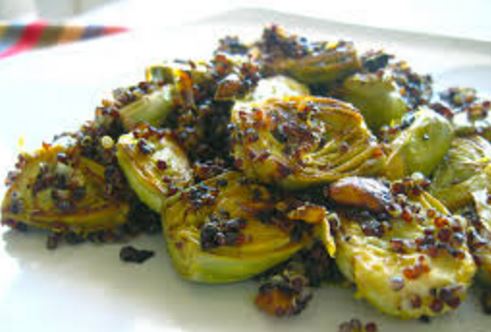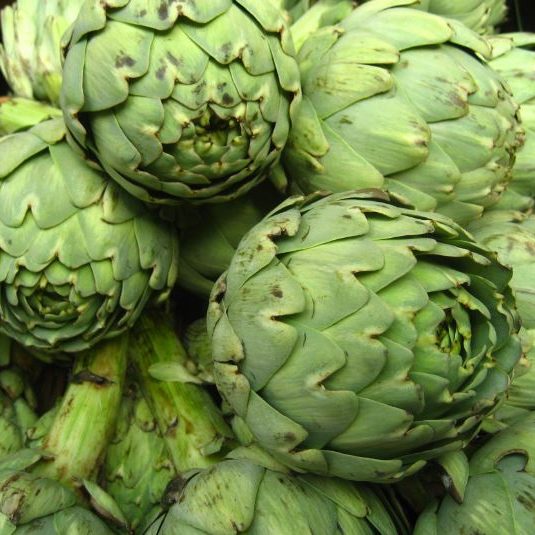Artichokes — Brain Cognitive Benefits/Brain Health
 The brain functions as a vasodilator as it allows more oxygen to reach the brain for a heightened cognitive function. The brain also relies on phosphorus for it to function properly. Phosphorus deficiencies have been closely related with a serious decline in cognitive ability. Therefore, if you want to keep your brain healthy and firing on all cylinders, eat your fill of artichokes.
The brain functions as a vasodilator as it allows more oxygen to reach the brain for a heightened cognitive function. The brain also relies on phosphorus for it to function properly. Phosphorus deficiencies have been closely related with a serious decline in cognitive ability. Therefore, if you want to keep your brain healthy and firing on all cylinders, eat your fill of artichokes.
Artichokes are known for their abundant supply of phosphorus, and can also provide around 12% of the recommended daily intake of vitamin K. This vitamin can provide protection against neuronal damage and degeneration, thus helping to keep any kind of cognitive diseases (e.g. dementia and Alzheimer’s disease) at bay in most elderly individuals.
According to a published study by the journal Nutrients, experts have found that eating a diet that included vitamin K was closely related with better cognition in elderly people.
Artichokes — Neuronal Damage, Dementia, and Alzheimer’s Disease
As you may have already known, artichokes can provide around 12% of the recommended intake of vitamin K. The said vitamin can offer protection against neuronal damage and degeneration; thus, helping keep cognitive diseases like dementia and Alzheimer’s disease at bay.
Artichokes are known to provide at least around 12% of the recommended daily intake of vitamin K. This vitamin can also offer protection against neural damage and degeneration, thus helping to keep cognitive diseases such as dementia and Alzheimer’s disease at bay in older people. In a study published by the journal Nutrients, researchers have discovered that eating a diet that included more vitamin K was linked with better cognition in older people.
Artichokes — Liver Health/Liver Function
 A 2010 study published in the Journal of Biological Trace Element Research stated that there’s a significant reduction on levels of lipids and cholesterol in the liver of mice when they were fed with a high-cholesterol diet when administered with artichoke extract.
A 2010 study published in the Journal of Biological Trace Element Research stated that there’s a significant reduction on levels of lipids and cholesterol in the liver of mice when they were fed with a high-cholesterol diet when administered with artichoke extract.
Artichokes, as well as artichoke extracts from the leaves and stems, are beneficial for the liver. Ongoing research seems to state that artichokes have certain components that may protect the liver and decrease blood lipids, such as cholesterol, in the body. There are other researchers who think that the mechanism for beneficial effects on the liver may be associated to increased form of bile from the liver. Among all of the powerful antioxidants in artichokes, cynarin and silymarin, have a potent positive effect on the liver.
These 2 powerful antioxidants has been shown to improve the overall health of the liver by reducing the presence, and eventually, eliminates toxins from the liver and the body. In addition, these antioxidants promoted regrowth and repair of damaged liver cells.
In addition, the bile production in the liver you gain can be attributed to artichokes. The bile produced helps eliminate hazardous toxins and digest the flavonoid silymarin (a powerful liver protectant). Silymarin averts the process of lipid peroxidation from occurring in the cell membranes of the liver’s tissues, making the artichoke an ideal weapon in your arsenal to help you attain optimal liver function.
Artichokes — Cancer Prevention

We have already established the antioxidant protection that some of the phytonutrients in artichokes can provide, but the cancer prevention benefits extend beyond this.
Rutin, quercetin and gallic acid in particular are able to induce apoptosis or cell death within the body, and while this may sound like a bad thing it can actually help to prevent the proliferation of cells which leads to many forms of cancer.
What’s more, a study released by the University of Georg-August showed how the phytonutrients found in artichokes can interfere with estrogen receptors and help to blunt the release of prostate specific antigen or PSA.
This suggests a great deal of promise in the use of artichoke leaf extract for the prevention and treatment of prostate cancer in men.
Artichokes have the highest antioxidant levels out of all vegetables, according to a study done by the USDA, and out of 1,000 plants different types of foods, they ranked #7 when it comes to antioxidant content. Antioxidants are one of the primary means of defense for the immune system against the effects of free radicals, natural byproducts of cell metabolsim that can lead to a number of dangerous conditions and diseases in the body, including cancer and heart disease.
The antioxidant properties of artichokes come from a wide array of sources, one of which are polyphenols, of which they have plenty. Polyphenols have chemopreventive qualities, which means that they can help slow down, stop or completely reverse the effects of cancer in patients. Their antioxidant ability comes from another source as well, their high levels of quercetin and rutin, two specific antioxidants that have been proven to lower the chances of developing cancer.
Vitamin C is also a well-known antioxidant, and it’s found in significant levels in artichokes. Vitamin C has been shown to actively discourage conditions like mucositis and fibrosis, and also to help lower the chances of breast cancer.
Finally, other studies have shown that the extract from artichoke leaves can be used to induce cell aptosis (cell death) as well as cell proliferation when injected in cancerous masses, and can help lower the chances for and effects of prostate and breast cancers, and also leukemia. Furthermore, the flavonoids found in artichokes have been found to lower the chances of breast cancer. Basically, eat your artichokes if you want to avoid getting cancer!
There are a lot of other potent polyphenol-type antioxidants found in artichokes that researchers believe can contribute to the prevention and maintenance of prostate and breast cancer and also leukemia. Studies also prove that the antioxidants rutin, quercetin and gallic acid found in artichoke leaf extract are able to induce apoptosis (cell death) and it can help lower the proliferation of cancer cells.
In a research done at Comenius University in Slovakia, artichoke leaf extract was studied for its ability to inhibit growth of leukemia cells. Over a 24-hour period, leukemia cells were treated with a wide array of concentrations of artichoke leaf extract, with results suggesting that it exerts an antiproliferative effect when it comes to leukemia cells while inducing apoptosis of these cells as well. In addition, researchers at the University of Georg-August in Germany have said that the myriad of phytochemicals in artichokes help to block the secretion of cancer agents, thus inhibiting the angiogenesis related to cancer.
Artichokes — Folic Acid
Artichokes are known to provide about 107 mcg of folic acid in a single serving, more than a quarter of the daily recommended amount of 400mcg. Women who are currently pregnant or planning to get pregnant should consume more artichokes than the recommended doses (it’s instrumental in preventing neural tube defects in developing embryos and increasing fertility in both men and women).
In addition, folic acid has been associated with the prevention of other complications that can happen during pregnancy and childbirth (these include pre-eclampsia, cleft lips and congenital heart defects). The list of pregnancy-related health benefits can be attributed to folic acid is extensive and growing (artichokes is an amazing addition to the diet any pregnant woman or nursing mother should consider).
Artichokes — Blood Pressure

Foods high in potassium like bananas, sweet potatoes, and artichokes help to maintain a healthy balance of electrolytes within the body.
Consuming a lot of potassium and magnesium is essential for offsetting the potentially harmful effects of consuming too much sodium, and in particular can help to prevent or ward off hypertension or high blood pressure.
Women and other people who are suffering from water retention may also find this useful due to it eliciting a mild diuretic effect to help shed off excess fluids from the body.
On a related note, artichokes are also rich sources of potassium, the essential mineral that has an impact on a number of organ systems all over the body. Potassium helps to neutralize the effects of excess sodium, which is known to help increase blood pressure.
Therefore, artichokes act as a vasodilator and is particularly useful for those already taking hypertension medicine to help prevent the effects of potassium deficiency. Diabetics are also encouraged to eat artichokes to help prevent complications linked with blood pressure and that disease. Finally, a reduction in blood pressure can help lower the chances of heart attacks and coronary heart disease!
Artichokes — Bone Health
 Artichokes is one of the best foods available in the market for acquiring all of the vitamins and minerals that you need, especially minerals like magnesium, potassium, phosphorus and manganese. For one, magnesium is essential because it helps enhance the uptake and absorption of calcium in the body, while potassium is considered to be the crucial building blocks of a lot of tissues. These minerals are needed for increasing bone health and density, thereby reducing the chances of conditions like osteoporosis from happening.
Artichokes is one of the best foods available in the market for acquiring all of the vitamins and minerals that you need, especially minerals like magnesium, potassium, phosphorus and manganese. For one, magnesium is essential because it helps enhance the uptake and absorption of calcium in the body, while potassium is considered to be the crucial building blocks of a lot of tissues. These minerals are needed for increasing bone health and density, thereby reducing the chances of conditions like osteoporosis from happening.
In addition, artichokes are also rich in vitamin K and it may help in the reduction of vascular calcification. It also plays an important role in the formation of bones and the general support of bone health. Also, artichokes contain vitamin C for immunity boosting, and are directly involved in the formation of a protein referred to as collagen (essential for skin health, bones and connective tissues).
Artichokes — Metabolic Function
Manganese is used in the metabolism of cholesterol, amino acids, and fatty acids. It’s considered to be the essential in enabling the body to rightfully use the nutrients in the food that we eat. The manganese content in artichokes is great for weight loss and maximizing your metabolism.
Artichokes — Protection Against Free Radicals
Artichokes have compounds that can essentially “scavenge” and neutralize free radicals and other kinds of environmental toxins before they can cause massive damage inside your body. You should know that artichokes are filled with all of the antioxidants that you need to ward off free radicals.
Artichokes — Heart Health
Cholesterol is referred to the fat build up within the arteries of the cardiovascular system. In addition, it can block blood flow, increase blood pressure, and can lead to fatal strokes and heart attacks.
Fortunately, you can prevent that from happening with the help of artichokes. Artichoke leaves have the ability to significantly lower the levels of bad cholesterol (LDL) and increase the levels of the good cholesterol (HDL or also referred to as omega-3 fatty acid).
Artichokes — Hangover Cure
Artichokes are a great salve for the liver. It has the ability to lower blockage, as well as lower the levels of toxins in the blood (considered to be the process of elimination). Therefore, artichokes are the perfect hangover cure for people who tend to booze it up so much (some chew on a few artichoke leaves right after a night of heavy drinking).
Artichokes — Birth Defects
Artichokes can also help pregnant women have a healthy, normally-developed child when they’re about to give birth. The high levels of folic acid present in artichokes can help prevent neural tube defect in newborns.
Artichokes — Metabolic Functions
Magnesium and manganese are both essential parts of your body’s metabolic processes. Magnesium is important in protein synthesis inside the body and it optimizes the intake of calcium by the body (strengthening the bones).
On the other hand, manganese is more involved in the metabolic process than the magnesium. It impacts the metabolic rates of cholesterol, amino acids and carbohydrates. Both of these nutrients are present in the artichoke, so better have your fill of it as you can.
Artichoke — Dietary Fiber
According to the 2005 Dietary Guidelines published by both the USDA and the Department of Health and Human Services, it’s recommended that men have at least 30-38 grams of dietary fiber per day, and women should consume at least 21-25 grams of it per day.
Currently, the regular American citizen consumes roughly around half of the said amount, leading to a lot of potential health issues like an increased risk of gut-related diseases and colonic cancer.
If you’re looking for a rich source of fiber, one 120g serving of artichoke should do the trick. It provides a whopping 10.3g of dietary fiber, making this a potent tool for helping not only to keep you regular, but also improves your overall digestive health. However, the digestive benefits of artichoke aren’t limited to just their fiber content alone; there’s a whole lot more to it than that.
Artichoke — Digestive Support/Digestive Health
German health professionals have long been recommending artichoke leaf extract as a gentle, soothing remedy for either an upset stomach or for indigestion. As a matter of fact, a study conducted with the help of 247 individuals showed that 86% of them reported a satisfactory improvement of symptoms like bloating after using artichoke leaf extract supplements. In addition, one of the major sources of fiber found in artichoke is insulin, a prebiotic, which helps increase the proportion of prebiotics in the gut.
Also, the high concentration of cyanarin in artichokes can help in the restoration of your digestive health. Cyanarin is known to stimulate the production of bile that allows you to digest fats and absorb vitamins from the food that you eat.
Artichoke – Digestive Issues
Artichokes are known as a rich source of dietary fiber, which is one of the most beneficial nutritional staples for improving the health and functionality of your digestive system. Fiber adds bulk to the food you’re about to consume, which helps to keep your bowel movements regular and normal, and lowers the symptoms of constipation, fiber can help lower the chances of a wide array of stomach and intestinal cancers, as well as bloating, cramps, excess flatulence, and general discomfot in the stomach.
Furthermore, if you’re experiencing problems with loose stool or diarrhea, fiber can help absorb excess liquid and form healthy, predictable bowel movements in patients. Plus, fiber is also known to act as a clean up crew for excess LDL cholesterol, thus cleaning the arteries and further lowering your chances of a heart disease.
Artichoke – Gallbladder
Artichoke has also been known to have a great impact on your gallbladders as well. It has the ability to soothe inflamed gallbladders and it can solve a blocked duct in the organ, thus allowing for normal functioning. In a way, artichokes can help trigger the production and secretion of gastric juices, as well as bile, which aids in proper digestion.
Artichokes — Cholesterol
In a 2001 study of 143 patients suffering from high levels of total blood cholesterol and were administered with 1800mg of artichoke leaf extract per dat for a period of six weeks.
Compared to the placebo, the artichoke leaf extract showed a clear reduction of around 20% “”bad”” LDL cholesterol and 18% blood cholesterol; the group taking the placebo lowered their total cholesterol level by around 8%.
Douglas Schar, DipPhyt, MCPP, MNIMH suggests trying natural remedies, especially artichoke. This extract helps decrease cholesterol levels before taking prescription drugs. Artichokes supplements are free of any side effects, and in my clinical experience, artichoke is a highly effective cholesterol reducer.
High cholesterol is associated with an increased risk for coronary heart disease and atherosclerosis. Artichokes and artichoke leaf extract lower cholesterol levels. The efforts to study this idea date back all the way to the 70s, when scientists began examining cynarin and cholesterol in their labs.
In a 12-week, double-blind study, 75 patients received placebo or 1,280mg standardized artichoke leaf daily. At the end of the 12-week period, the treared group recorded a modest reduction in total cholesterol of 4.2%.
To further demonstrate the artichoke’s heart-healthy powers, scientists set up a randomized, placebo-controlled study to examine the effect of artichoke leaf extract in patients with high cholesterol. All participants showed positive results. Over 6 weeks, participants were split up, with half receiving artichoke extract and the rest a placebo. The patients who got artichoke were shown to have an 18.5% reduction in their levels of cholesterol.
Artichoke — Antioxidants
A study conducted by the US Department of Agriculture in 2006 and published in the American Journal of Clinical Nutrition proved that the phytonutrients in artichokes provide a strong antioxidant benefit to anyone who uses it. A single serving of such can help provide a greater antioxidant benefit per serving than other foods traditionally considered to be rich in antioxidants – foods like dark chocolate, blueberries, and red wine.
Artichoke — Heart Disease
Anthocyanins, quercetin, rutin and a lot of other antioxidants contained in fresh artichokes offer a wide array of health benefits ranging from the prevention of cancer and immune support to protection against heart disease. Anthocyanins, quercetin, rutin and a lot of other antioxidants contained in fresh artichokes offer a wide array of health benefits ranging from the prevention of cancer and immune support to protection against heart disease.
Artichoke — Bloating
German doctors have long recommended artichoke leaf extract as a gentle remedy for both indigestion and for an upset stomach. This may be due to a compound found in artichokes known as cynarin, which has been shown to help increase the production of bile, thus helping speed up the movement of food and waste through the intestines and lowers the feelings of bloating. As a matter of fact, a study conducted with 247 people demonstrated that 86% reported a satisfactory improvement of symptoms like bloating and flatulence after using artichoke leaf extract supplement.
One of the major sources of fiber found in artichokes is insulin, which is known to be a prebiotic. Prebiotics can help increase the proportion of probiotics or ‘good bacteria’ in the gut.







